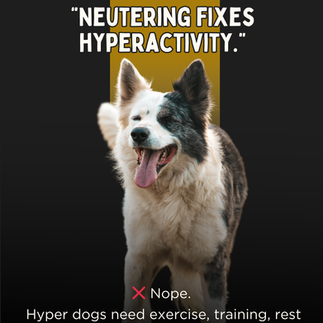The Hidden Truth About Neutering Your Dog: What Every Owner Should Know
- Ellen Greenwood-Sole
- Sep 2, 2025
- 4 min read
For decades, neutering has been presented as the gold standard of responsible dog ownership. Veterinarians, shelters, and even dog trainers often talk about it as if it’s just another basic health measure—like brushing your dog’s teeth or keeping up with vaccinations.
But the truth is more complex. While neutering certainly has its place—especially in preventing unwanted litters and reducing certain medical risks—it isn’t without consequences. In fact, new research suggests that the decision to neuter your dog has long-term effects on both their physical and emotional wellbeing.
This isn’t about scaremongering. It’s about balance. Owners deserve to know the full picture, not just the benefits, so they can make informed decisions for their dogs.
What Testosterone Really Does
One of the biggest myths around neutering is that testosterone is simply the “humping and marking” hormone. In reality, testosterone plays a systemic role in the body and is vital for overall health.
Testosterone helps regulate:
Muscle mass and strength – Important for supporting joints and mobility.
Bone density – Essential in preventing early-onset arthritis and skeletal problems.
Joint health – Research shows that dogs neutered early may have a higher risk of cruciate ligament injuries.
Fat distribution – Hormones influence how and where the body stores fat, which in turn impacts metabolism and risk of obesity.
Emotional regulation – Testosterone contributes to confidence, resilience, and emotional stability.
When testosterone is removed, the body doesn’t just lose reproductive capacity—it loses a hormone that plays an important role in day-to-day functioning.
Neutering and Behaviour: Separating Myth from Fact
A common reason owners give for neutering is behaviour. You’ll often hear:
“He’s too hyper, neutering will calm him down.”
“I’m worried about aggression—taking his testosterone away will fix it.”
“He’s humping everything, neutering will stop it.”
Here’s the truth:
Hyperactivity is not caused by testosterone. It’s usually the result of unmet needs (lack of exercise, insufficient training, or overstimulation). Neutering doesn’t “calm” a hyper dog—it may even increase anxiety in some cases.
Aggression is complex and rarely hormone-driven. In fact, some studies suggest neutering can increase fear-based aggression, especially if done early.
Humping isn’t always sexual. It can be a displacement behaviour linked to excitement, stress, or play. Neutering won’t necessarily stop it.
Behavioural challenges are best addressed through training, enrichment, and management—not surgery.
Health Risks Linked to Neutering
While neutering does reduce the risk of testicular cancer and can lower the incidence of some prostate conditions, it also increases the risk of other health problems. Research over the past decade has highlighted several areas of concern:
Orthopaedic Issues: Early neutering is linked to higher rates of cruciate ligament tears, hip dysplasia, and other joint disorders. Large-breed dogs appear to be particularly vulnerable.
Certain Cancers: Studies from UC Davis (Hart et al., 2013) found that neutered dogs had a higher risk of lymphoma, osteosarcoma, and hemangiosarcoma compared to intact dogs.
Obesity and Metabolic Issues: Neutered dogs are more prone to weight gain, partly due to hormonal changes affecting metabolism.
Urinary Incontinence: More common in neutered females, but also documented in some males.
Cognitive and Emotional Changes: Hormonal disruption can affect confidence, stress responses, and social behaviour.
This doesn’t mean neutering is always harmful—but it does mean the risks need to be weighed carefully, rather than dismissed as negligible.
When Neutering Does Make Sense
There are situations where neutering is absolutely the right choice:
To prevent unwanted breeding, particularly in multi-dog households.
To treat certain medical conditions (e.g., testicular cancer, severe prostate disease).
In cases where roaming or escape behaviour puts the dog’s safety at risk.
The key is recognising that neutering is not a “fix-all” for behaviour, and it carries trade-offs that must be considered in context.
Alternatives to Traditional Neutering
For owners who are hesitant about removing hormones completely, there are alternatives worth discussing with your vet:
Chemical castration (e.g., Suprelorin implant) – Provides a reversible way to suppress testosterone and observe behavioural or health changes before making a permanent decision.
Vasectomy – Prevents reproduction but leaves hormones intact. Not commonly offered but worth exploring.
Ovectomy (for females) – Removes the ovaries but leaves the uterus, with some health benefits while preserving natural hormone cycles.
These options allow for more flexibility and can be especially useful in young dogs who aren’t yet fully developed.
A Call for Informed Choice
The biggest issue with how neutering is discussed today is not the procedure itself—it’s the lack of balanced information. Too often, neutering is presented as standard, harmless, and universally beneficial, without acknowledging the potential downsides.
As responsible dog owners, we need to move away from a “one-size-fits-all” approach. Every dog is an individual, with unique health risks, lifestyle factors, and behavioural needs. What’s right for one may not be right for another.
Before deciding to neuter, ask yourself:
Am I considering this for convenience, or for my dog’s long-term wellbeing?
Has my dog finished growing and developing physically?
What does the latest research say about neutering and my dog’s breed/size?
Are there alternatives I should explore first?
Final Thoughts
Neutering is neither all good nor all bad. It’s a medical procedure with both benefits and risks. By looking beyond the myths and understanding the bigger picture, you can make an informed decision that supports your dog’s health, happiness, and longevity.
Your dog depends on you to advocate for their wellbeing. That means questioning standard advice, weighing the evidence, and choosing what’s truly best for them—not just what’s convenient or expected.




















Comments